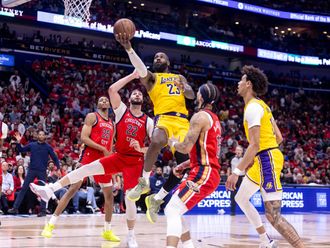Rio de Janeiro: International Olympic Committee officials do not do much in the way of queuing.
All over Rio, as the ordinary spectators stand around in lines patiently waiting to be scanned and body-searched and checked and scrutinised before they are allowed into venues, the guys in charge swish through entries marked, with magnificent self-importance, “Preferential Queue”. Which is probably why, if reports are true, Patrick Hickey was at the back of the line when it came to the dispensing of common sense.
Poor chap: as an IOC official he just did not have the experience of understanding the queuing system. Hickey, Ireland’s Olympic chief, was hauled from his shower in his swanky hotel room early one morning this week and whisked off to a police station.
Which made Ireland’s score at these Games so far two medals and one arrest.
He was charged with illegally selling tickets which had been given to him to pass on to sponsors and athletes’ family and friends.
Instead, he allegedly siphoned them off to touts, at a handy profit.
If true, is it evidence perhaps of the priorities of those in authority? What made the crime of which Hickey stands accused all the more stomach-churning was its utter futility. Why would anyone tout tickets at an event where little has been sold out? On Wednesday night I was stood in a queue at the box office in the Rio Olympic Park looking to buy a grandstand seat for the triathlon, and there was an American in front of me who was buying a seat for the US basketball that had just got under way. His friend, he explained, had texted him from inside the venue saying it was half empty. So he got himself a ticket from official sources. No need for touts when the box office door was propped open by the pile of unsold briefs. There has been much to admire about the Rio Games. But the crowds? Dear me. For most of the time they have been woeful. Sure, there have been exceptions: the golf, the football when Brazil are playing, the rowing lake on its final day. And latterly there has been an evident attempt to paper the house.
At the table tennis this week, in a packed stand, I sat alongside a cheery Brazilian family, loudly supporting the Chinese competitor.
And suddenly there was a sense of what these Games should be: there was a carnival going on in the stands. But for most of it: nothing to report. Not that officials seem remotely perturbed about the dismaying pictures being beamed round the world of whole stands left unfilled.
They concoct fanciful excuses for the gaps in the bleachers about the fans buying tickets for several simultaneous events, about Americans not showing up because of unfounded fears of Zika, about poor quality food at the venues. But now we maybe have a better inkling of what is going on.
Thanks to the allegations against one Irishman, we have been gifted precious insight. Could it be that hundreds who might have attended have been prevented from doing so? Was Hickey the subject of a complaint from touts landed with unsellable tickets? Mind, getting to the front of the queue to expose IOC corruption must have taken some tenacity: after the hopeless failure to allow the public access to what is rapidly becoming a private junket, there are a lot waiting patiently in line right now to point the finger.












